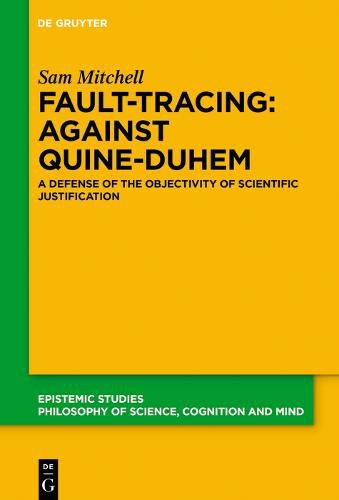Readings Newsletter
Become a Readings Member to make your shopping experience even easier.
Sign in or sign up for free!
You’re not far away from qualifying for FREE standard shipping within Australia
You’ve qualified for FREE standard shipping within Australia
The cart is loading…






This title is printed to order. This book may have been self-published. If so, we cannot guarantee the quality of the content. In the main most books will have gone through the editing process however some may not. We therefore suggest that you be aware of this before ordering this book. If in doubt check either the author or publisher’s details as we are unable to accept any returns unless they are faulty. Please contact us if you have any questions.
It is widely believed in philosophy of science that nobody can claim that any verdict of science is forced upon us by the effects of a physical world upon our sense organs and instruments. The Quine-Duhem problem supposedly allows us to resist any conclusion. Views on language aside, Quine is supposed to have shown this decisively.
But it is just false. In many scientific examples, there is simply no room to doubt that a particular hypothesis is responsible for a refutation or established by the observations.
Fault Tracing shows how to play independently established hypotheses against each other to determine whether an arbitrary hypothesis needs to be altered in the light of (apparently) refuting evidence. It analyses real examples from natural science, as well as simpler cases. It argues that, when scientific theories have a structure that prevents them from using this method, the theory looks wrong, and is subject to serious criticism. This is a new, and potentially far-reaching, theory of empirical justification.
$9.00 standard shipping within Australia
FREE standard shipping within Australia for orders over $100.00
Express & International shipping calculated at checkout
This title is printed to order. This book may have been self-published. If so, we cannot guarantee the quality of the content. In the main most books will have gone through the editing process however some may not. We therefore suggest that you be aware of this before ordering this book. If in doubt check either the author or publisher’s details as we are unable to accept any returns unless they are faulty. Please contact us if you have any questions.
It is widely believed in philosophy of science that nobody can claim that any verdict of science is forced upon us by the effects of a physical world upon our sense organs and instruments. The Quine-Duhem problem supposedly allows us to resist any conclusion. Views on language aside, Quine is supposed to have shown this decisively.
But it is just false. In many scientific examples, there is simply no room to doubt that a particular hypothesis is responsible for a refutation or established by the observations.
Fault Tracing shows how to play independently established hypotheses against each other to determine whether an arbitrary hypothesis needs to be altered in the light of (apparently) refuting evidence. It analyses real examples from natural science, as well as simpler cases. It argues that, when scientific theories have a structure that prevents them from using this method, the theory looks wrong, and is subject to serious criticism. This is a new, and potentially far-reaching, theory of empirical justification.